Description
ENG2613 Assignment 1 Semester 1 Memo | Due 16 April 2025. All questions fully answered. Question 1
Read the story below and then answer the questions that follow.
I want to be a chef!
By Kgosi Kgosi
In the town of Mahikeng, there lived a young boy named Kabelo. He loved nothing
more than cooking. He cooked good food that everyone in his family enjoyed. Kabelo
was also good at baking. He baked cakes and bread. He also made soup for homeless
people in his community.
One morning at school, Mrs Ramaila, Kabelo’s teacher, asked everyone in the class
to say what they would like to do after they finish school one day.
A girl stood up. “I would like to be an astronaut and go to space,” she said.
“I would like to be a doctor,” said one of the boys.
Then Kabelo stood up. “I would like to earn a living by cooking,” he said. “I want to be
a chef.”
All the children were shocked. First they stared at Kabelo and then they all started
laughing.
“But cooking is for girls,” laughed one of the girls.
Mrs Ramaila told everyone to be quiet. “You can be anything you want to be, Kabelo,”
she said kindly. “Don’t listen to them.” But Kabelo’s feelings were already hurt.
On the way home from school the other children kept on teasing him.
When he got home, Kabelo found his father washing the dishes while his mother made
lunch.
“How was school today?” asked his father.
“Everyone laughed at me when I told them I wanted to be a chef and cook for a living,”
explained Kabelo. “They said that boys don’t cook and that cooking is for girls. They
also said real boys play rugby and soccer. But I don’t like those things!”
His father hugged him. “Do you know that some of the best chefs in the world are
men?”
Kabelo was surprised and said, “Really?”
“Yes!” said his father as he took his cellphone out of his pocket. “Look!” He showed
Kabelo pictures of the many chefs around the world who were men. They looked at
pictures of all the good food the chefs had cooked and Kabelo started to feel a little
better.
“You should enter a cooking competition, Kabelo,” his mother said to him. “There is
one called The Young Super Chef and it is on television.”
His father agreed. “Yes,” he said, “your cooking is very good. You could win that
competition.”
And that was how it came about that Kabelo entered The Young Super Chef
competition.
A few months later, as part of the competition, Kabelo was on television. He found
himself amongst other young chefs just like him. Some of them were boys who loved
cooking – just like him!
The competition was really tough! The young chefs were asked to cook meals they
had never cooked before. They also had to use ingredients they had never heard of
before. One by one, they were voted out by the judges. Kabelo saw them cry as they
left. He did not want the same thing to happen to him. He concentrated extra hard to
make sure that he didn’t make any mistakes.
When Kabelo ended up in the final round of the competition, his mother and father
were so proud of him! The whole school was watching on television – even the boys
and girls who had made fun of him. Kabelo was making his school proud.
Kabelo felt nervous. The competition was nearly over, but there was one person left
he had to beat in order to win. The problem was, that young chef was as good as
Kabelo was!
The final round started. The two young chefs each had an hour to cook their meal.
Fifteen minutes into the round, Kabelo dropped a bowl filled with the mixture for a
chicken pie onto the floor. He wasn’t allowed to pick the mixture up – that would mean that he would lose the competition. So he had to start all over again. Now it would be
a struggle for him to finish in time. Everyone watching was worried, but Kabelo
managed to finish his dish just in time.
Then the judges had to taste the food. This would decide who the winner would be!
They tasted Kabelo’s food and said that they thought it was very good. Then they
tasted the food of the other young chef. They thought that was very good too! They
left to make a final decision. The audience knew that choosing a winner was going to
be difficult.
It was a whole hour before the judges came back with a final decision. The winner was
… Kabelo! His parents were so happy and proud! Their son was The Young Super
Chef of the year. Kabelo won a trophy and prize money.
The next day Kabelo took his trophy to school and everyone there celebrated with him.
Kabelo had shown everyone that boys could be chefs too!
“I’m glad you didn’t listen to some of the children when they teased you,” said Mrs
Ramaila. “You see, I told you, you could be anything you want to be!”
1.1 What kind of literature does this story belong to? Is it fiction or non-fiction; fantasy
or realism; prose, poetry or drama? Give reasons for your answers.
(6 marks)
1.2 Write a paragraph in which you discuss what kinds of stereotypes the story
engages with. What is the story’s message regarding such stereotypes? Provide
at least three examples from the story to explain how the story conveys this
message.
(10 marks)
1.3 Do you think this story is appropriate for a diverse and multicultural South African
intermediate phase FAL classroom? Write a paragraph in which you give at least
three reasons for your answer.
Question 2
Read the poem below and then answer the questions that follow.
Dreams
By Langston Hughes
Hold fast to dreams
For if dreams die
Life is a broken-winged bird
That cannot fly.
Hold fast to dreams
For when dreams go
Life is a barren field
Frozen with snow.
2.1 Identify the figure of speech in lines 2-4 and discuss how this figure of speech
contributes to the overall meaning of the poem.
(5 marks)
2.2 Identify the figure of speech in lines 6-8 and discuss how this figure of speech
contributes to the overall meaning of the poem.
(5 marks)
2.3 Do you think this poem is appropriate for a diverse and multicultural South
African intermediate phase FAL classroom? Write a paragraph in which you give at
least three reasons for your answer.
2.4 Unit 2 in your study guide is called “Poetry in Motion”. This reminds educators
that poetry must not be left “on the page” but brought to life i.e., the printed text
should not be the only source of meaning. Write a paragraph in which you explain
three activities that you could use when teaching this poem to “take it off the page”.
(6 marks)
Total: 50 marksENG2613 Assignment 1 Semester 1 Memo | Due 16 April 2025. All questions fully answered. Question 1
Read the story below and then answer the questions that follow.
I want to be a chef!
By Kgosi Kgosi
In the town of Mahikeng, there lived a young boy named Kabelo. He loved nothing
more than cooking. He cooked good food that everyone in his family enjoyed. Kabelo
was also good at baking. He baked cakes and bread. He also made soup for homeless
people in his community.
One morning at school, Mrs Ramaila, Kabelo’s teacher, asked everyone in the class
to say what they would like to do after they finish school one day.
A girl stood up. “I would like to be an astronaut and go to space,” she said.
“I would like to be a doctor,” said one of the boys.
Then Kabelo stood up. “I would like to earn a living by cooking,” he said. “I want to be
a chef.”
All the children were shocked. First they stared at Kabelo and then they all started
laughing.
“But cooking is for girls,” laughed one of the girls.
Mrs Ramaila told everyone to be quiet. “You can be anything you want to be, Kabelo,”
she said kindly. “Don’t listen to them.” But Kabelo’s feelings were already hurt.
On the way home from school the other children kept on teasing him.
When he got home, Kabelo found his father washing the dishes while his mother made
lunch.
“How was school today?” asked his father.
“Everyone laughed at me when I told them I wanted to be a chef and cook for a living,”
explained Kabelo. “They said that boys don’t cook and that cooking is for girls. They
also said real boys play rugby and soccer. But I don’t like those things!”
His father hugged him. “Do you know that some of the best chefs in the world are
men?”
Kabelo was surprised and said, “Really?”
“Yes!” said his father as he took his cellphone out of his pocket. “Look!” He showed
Kabelo pictures of the many chefs around the world who were men. They looked at
pictures of all the good food the chefs had cooked and Kabelo started to feel a little
better.
“You should enter a cooking competition, Kabelo,” his mother said to him. “There is
one called The Young Super Chef and it is on television.”
His father agreed. “Yes,” he said, “your cooking is very good. You could win that
competition.”
And that was how it came about that Kabelo entered The Young Super Chef
competition.
A few months later, as part of the competition, Kabelo was on television. He found
himself amongst other young chefs just like him. Some of them were boys who loved
cooking – just like him!
The competition was really tough! The young chefs were asked to cook meals they
had never cooked before. They also had to use ingredients they had never heard of
before. One by one, they were voted out by the judges. Kabelo saw them cry as they
left. He did not want the same thing to happen to him. He concentrated extra hard to
make sure that he didn’t make any mistakes.
When Kabelo ended up in the final round of the competition, his mother and father
were so proud of him! The whole school was watching on television – even the boys
and girls who had made fun of him. Kabelo was making his school proud.
Kabelo felt nervous. The competition was nearly over, but there was one person left
he had to beat in order to win. The problem was, that young chef was as good as
Kabelo was!
The final round started. The two young chefs each had an hour to cook their meal.
Fifteen minutes into the round, Kabelo dropped a bowl filled with the mixture for a
chicken pie onto the floor. He wasn’t allowed to pick the mixture up – that would mean that he would lose the competition. So he had to start all over again. Now it would be
a struggle for him to finish in time. Everyone watching was worried, but Kabelo
managed to finish his dish just in time.
Then the judges had to taste the food. This would decide who the winner would be!
They tasted Kabelo’s food and said that they thought it was very good. Then they
tasted the food of the other young chef. They thought that was very good too! They
left to make a final decision. The audience knew that choosing a winner was going to
be difficult.
It was a whole hour before the judges came back with a final decision. The winner was
… Kabelo! His parents were so happy and proud! Their son was The Young Super
Chef of the year. Kabelo won a trophy and prize money.
The next day Kabelo took his trophy to school and everyone there celebrated with him.
Kabelo had shown everyone that boys could be chefs too!
“I’m glad you didn’t listen to some of the children when they teased you,” said Mrs
Ramaila. “You see, I told you, you could be anything you want to be!”
1.1 What kind of literature does this story belong to? Is it fiction or non-fiction; fantasy
or realism; prose, poetry or drama? Give reasons for your answers.
(6 marks)
1.2 Write a paragraph in which you discuss what kinds of stereotypes the story
engages with. What is the story’s message regarding such stereotypes? Provide
at least three examples from the story to explain how the story conveys this
message.
(10 marks)
1.3 Do you think this story is appropriate for a diverse and multicultural South African
intermediate phase FAL classroom? Write a paragraph in which you give at least
three reasons for your answer.
Question 2
Read the poem below and then answer the questions that follow.
Dreams
By Langston Hughes
Hold fast to dreams
For if dreams die
Life is a broken-winged bird
That cannot fly.
Hold fast to dreams
For when dreams go
Life is a barren field
Frozen with snow.
2.1 Identify the figure of speech in lines 2-4 and discuss how this figure of speech
contributes to the overall meaning of the poem.
(5 marks)
2.2 Identify the figure of speech in lines 6-8 and discuss how this figure of speech
contributes to the overall meaning of the poem.
(5 marks)
2.3 Do you think this poem is appropriate for a diverse and multicultural South
African intermediate phase FAL classroom? Write a paragraph in which you give at
least three reasons for your answer.
2.4 Unit 2 in your study guide is called “Poetry in Motion”. This reminds educators
that poetry must not be left “on the page” but brought to life i.e., the printed text
should not be the only source of meaning. Write a paragraph in which you explain
three activities that you could use when teaching this poem to “take it off the page”.
(6 marks)
Total: 50 marks



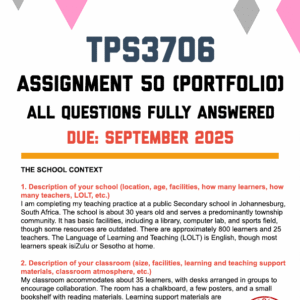
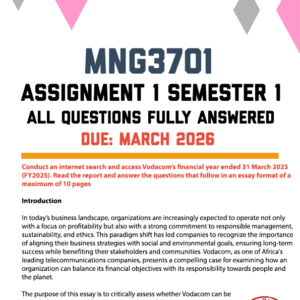


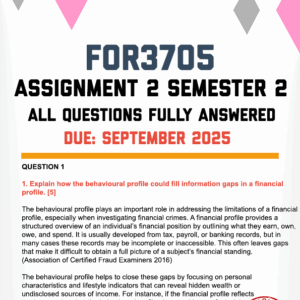
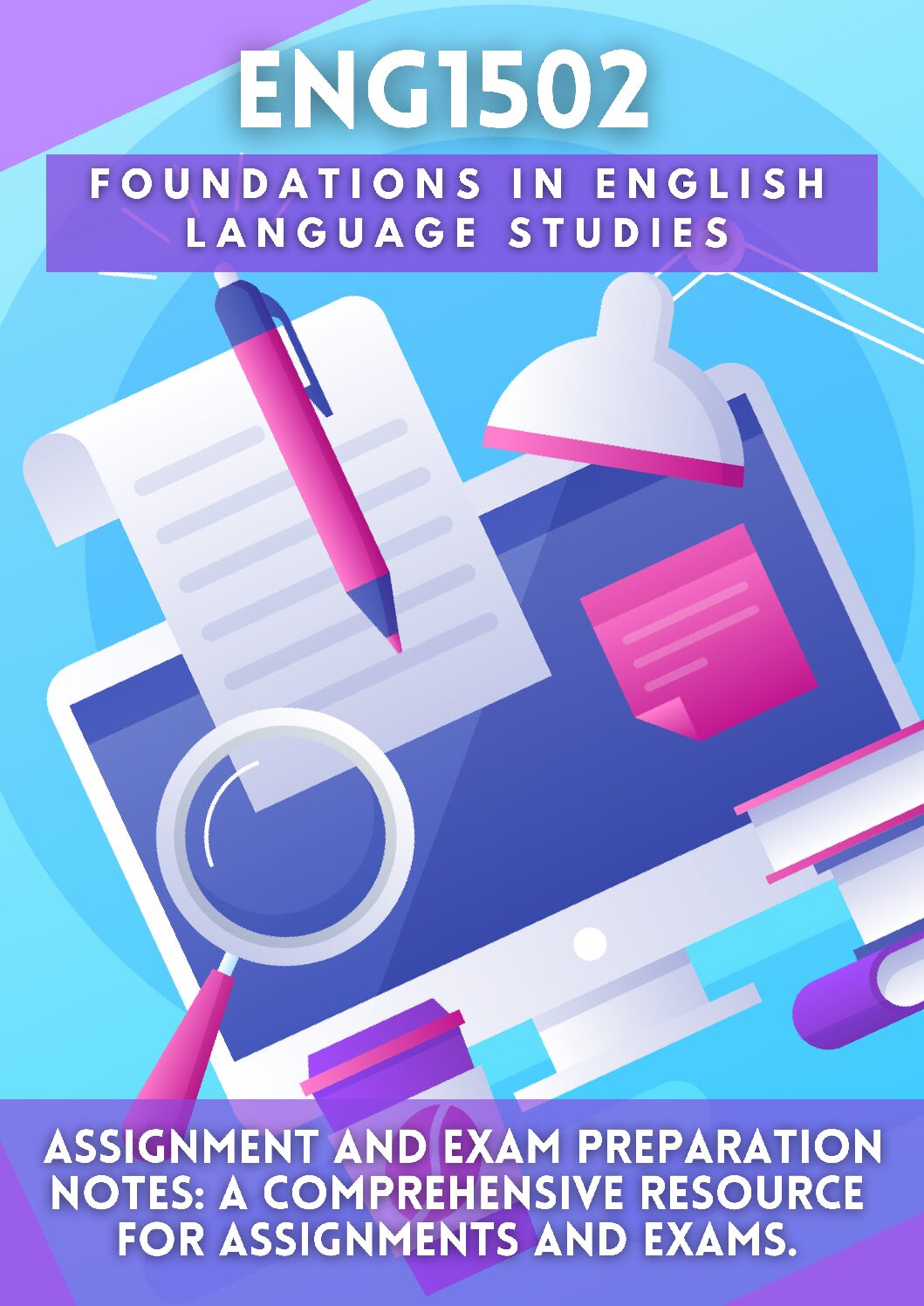

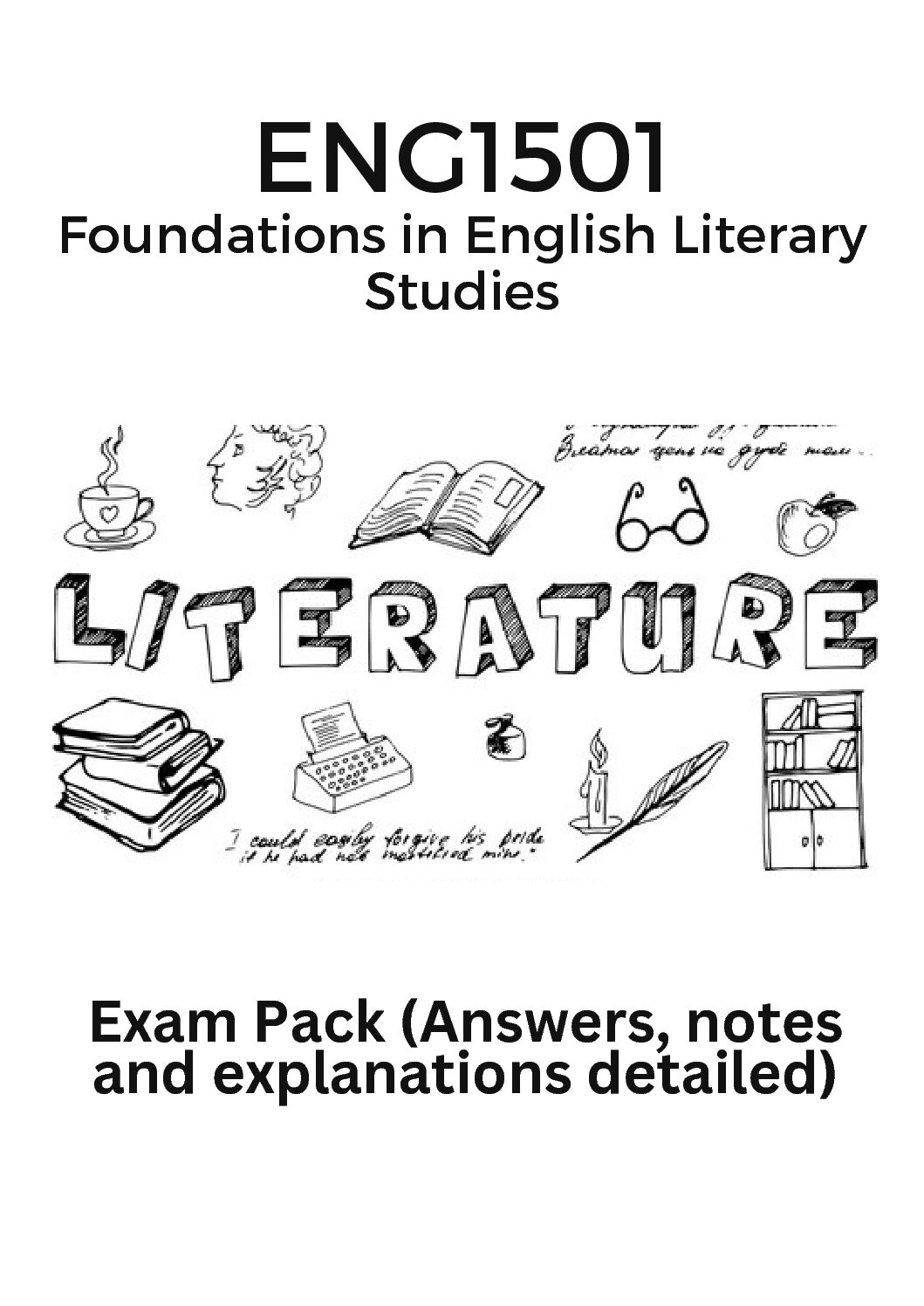
Reviews
There are no reviews yet.